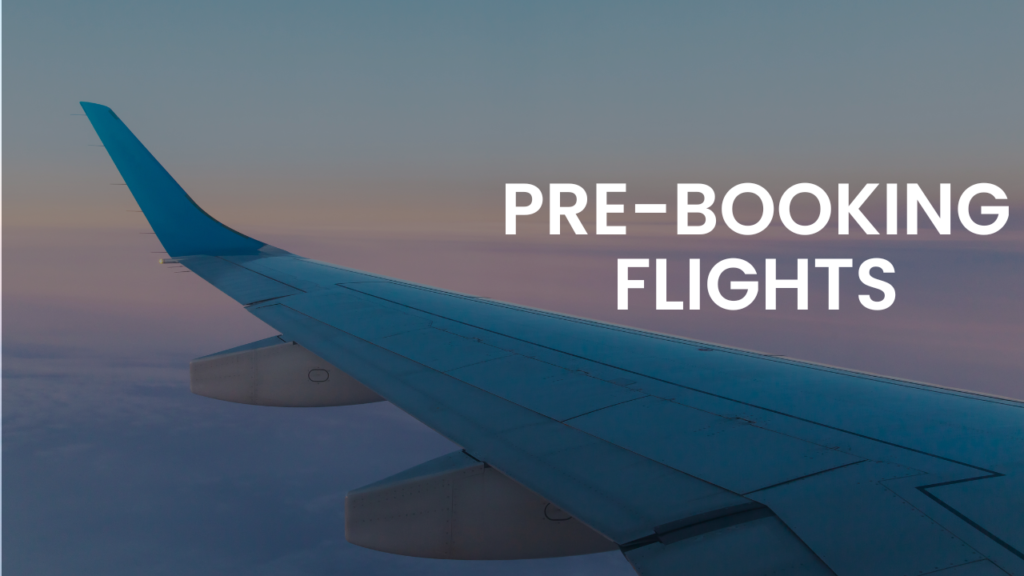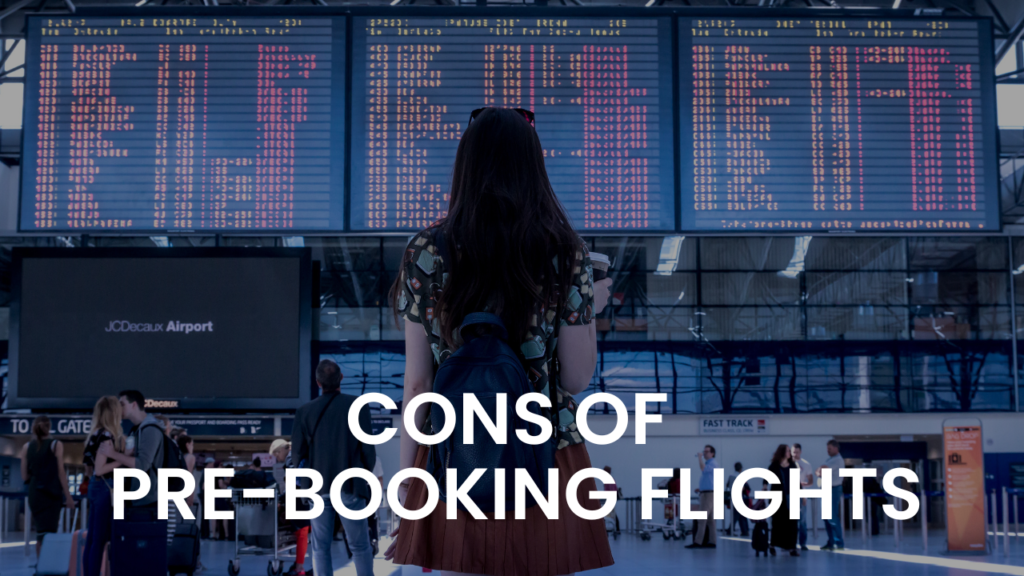
Booking flights in advance can be a game-changer for travelers, offering both advantages and potential drawbacks. Whether you’re planning a vacation, a business trip, or a last-minute getaway, understanding the pros and cons of pre-booking flights will help you make informed decisions. In this guide, we’ll explore the benefits, risks, and essential tips for booking flights ahead of time.
Pros of Pre-Booking Flights

1. Lower Prices
Airlines often release tickets at lower prices when flights are first made available. As the departure date approaches, prices may increase due to demand. Booking early can help you secure a better deal, especially during peak travel seasons or holidays.
2. More Options
Early bookings provide a wider range of choices for seating, preferred airlines, and flight timings. You can select the most convenient routes, avoid unwanted layovers, and choose preferred meal options if available.
3. Peace of Mind
Pre-booking flights means you don’t have to worry about last-minute price surges or availability issues, allowing you to plan your trip with confidence. It ensures that you have a guaranteed seat on your desired flight, reducing stress closer to your departure date.
4. Availability of Promotional Offers
Many airlines offer discounts, deals, and early bird promotions. Booking in advance increases your chances of availing these special offers, helping you save money on travel expenses.
5. Better Travel Planning
With flights secured, you can plan accommodation, itinerary, and other travel essentials efficiently without worrying about changing prices. Pre-booking also allows you to coordinate better with travel companions and align schedules accordingly.
Cons of Pre-Booking Flights

1. Price Drops After Booking
Sometimes, airlines drop prices due to promotions or decreased demand. If you book too early, you might miss out on a better deal. This can be frustrating, especially when you see a cheaper fare after already confirming your booking.
2. Limited Flexibility
Pre-booked tickets often come with restrictions on changes, refunds, or cancellations. If your travel plans are uncertain, early booking might not be ideal. Some airlines charge hefty modification fees, making it difficult to adjust your plans without incurring extra costs.
3. Unexpected Circumstances
Changes in work schedules, personal emergencies, or global events (like COVID-19) can disrupt travel plans. If the airline does not offer flexible options, you may end up losing money on a non-refundable ticket.
4. Better Deals Closer to Departure
Last-minute deals on unsold seats are sometimes available, making it possible to book at a lower rate than early buyers. However, this is risky as seat availability may be limited, especially for popular routes.
A Complete Guide to Pre-Booking Flights

1. Determine the Best Booking Window
- Domestic Flights: 1-3 months in advance.
- International Flights: 3-6 months in advance.
- Holiday Season: Book 6-12 months in advance to avoid price hikes.
2. Use Flight Comparison Tools
Websites like Google Flights, Skyscanner, and Kayak help compare prices across different airlines and track fare changes. These tools can notify you when prices drop, ensuring you get the best deal.
3. Set Price Alerts
Use travel apps to monitor price fluctuations and get notified when fares drop. Booking at the right time can save you a significant amount of money.
4. Consider Refundable or Flexible Tickets
If your travel dates aren’t fixed, opt for refundable tickets or ones with free changes to avoid cancellation fees. This is especially useful for business travelers and families who might face unexpected changes.
5. Check Airline Policies
Some airlines allow free changes or credits for future travel. Read the terms carefully before booking to ensure you have options if your plans change.
6. Book on the Right Day
Studies suggest that booking on a Tuesday or Wednesday might get you the best deals, while weekends tend to have higher fares. Airlines often release fare updates midweek, so tracking prices during this time can be beneficial.
7. Avoid Peak Travel Days
Flights on Fridays, Sundays, and holidays tend to be more expensive. Traveling mid-week can save you money, and airports are often less crowded on these days.
8. Use Airline Miles and Credit Card Rewards
If you have frequent flyer points or travel rewards, redeem them for discounts or upgrades. Many credit cards offer travel perks, such as free checked bags, lounge access, and priority boarding.
Conclusion
Pre-booking flights can be a great way to secure lower prices, better seating, and peace of mind. However, it also comes with risks like price drops and limited flexibility. By following the right strategies, such as using fare alerts, booking at the optimal time, and understanding airline policies, you can make the most of your early flight reservations.
At Build Travel, we make flight booking easy and hassle-free with our competitive prices and expert guidance. Whether you’re booking a domestic or international flight, our team ensures you get the best deals and a seamless experience. With our Travel Now, Pay Later option, you can book your flights and pay in four easy installments through Tabby, making travel more affordable for everyone.
For more travel insights, check out our blogs on top travel destinations, honeymoon packages, hotel booking tips, and Umrah bus services to enhance your journey! Whether you’re planning a romantic getaway, a family vacation, or a spiritual trip, Build Travel has the perfect package for you.


